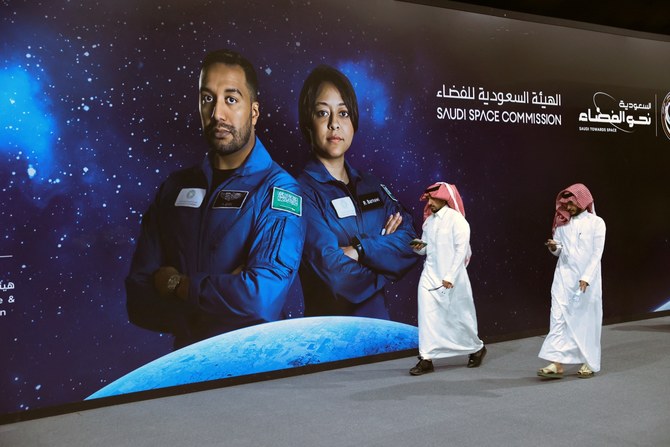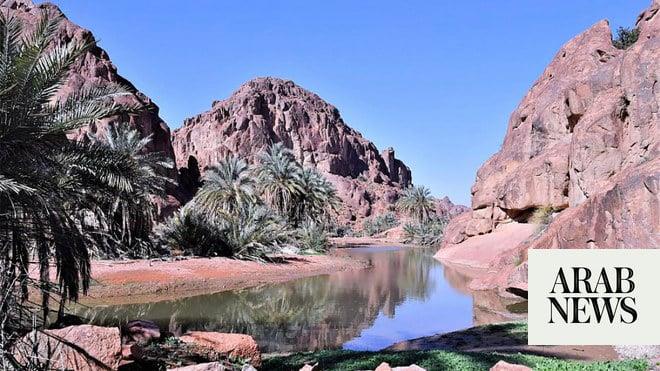
Saudi Arabia is undergoing a massive economic overhaul and the domestic space industry has emerged as a particularly promising sector for innovation and investment.
Globally, the space economy is a lucrative area for investment that is forecast to grow in value to $1 trillion this year. In 2022, the Saudi space industry generated an unprecedented $400 million in revenue and is predicted to reach an average annual value of $2.2 billion by 2030.
One of the goals of the Saudi Vision 2030 national development and diversification plan is to create a global investment powerhouse, and to that end there is a strong case for utilizing advanced scientific research and human development to create a robust knowledge economy.
Given the potential of space sciences for enhancing the study of subjects such as health and medicine, transportation and information technology, Saudi authorities are seeking avenues through which to establish diplomatic and commercial partnerships in the space sector.
The latest and most innovative development in this field is space tourism. Global space tourism company Halo Space recently announced its next commercial stratospheric test flight will be launched from a site in Saudi Arabia in June. This will be the sixth test of the company’s innovative prototype capsule, which will soar to an altitude of 32 kilometers above the Earth’s surface.
An advanced space industry is crucial to national security and defense preparedness
Zaid M. Belbagi
This project has been approved by the Communications, Space and Technology Commission, the Kingdom’s official space regulator and, if all goes well, starting in 2026 tourists will be able to take off from a launchpad in Saudi Arabia and fly into the stratosphere at the cost of $164,000. Reports suggest that by 2030, the size of the Saudi space tourism sector could reach $600 million in revenue.
Two government agencies are at the forefront of Saudi space sector reforms. One of them is the aforementioned Communications, Space and Technology Commission. It was established in 2001 to oversee the regulation of the communications and IT sector, including the use of information and communication technologies and space to upgrade Saudi communications infrastructure. It is involved in expanding fiber internet coverage and digital connectivity across the Kingdom.
The other is the Saudi Space Agency, which was established in 2018 and is responsible for development and innovation in the nation’s space sector, with a focus on the use of space science and exploratory missions to create new opportunities. This includes the localization of space technology, the promotion of peaceful and civil usage of that technology, and efforts to establish Saudi Arabia as an emerging regional and international leader in the field.
These two agencies work hand-in-hand to promote space research and entrepreneurship, and ensure the efficient administration of the space sector in the Kingdom.
An advanced space industry is crucial to national security and defense preparedness. Saudi Arabia is the biggest spender on defense in the region and sixth-largest globally. In recent years, it has actively invested in the acquisition of defense technologies and vocational training to build an efficient and independent domestic defense industry.
The field of satellite communications is where the space sector and national defense strategies meet. Satellites are crucial for improving military communications, and they also support navigation, weather forecasting and environmental monitoring.
The field of satellite communications is where the space sector and national defense strategies meet
Zaid M. Belbagi
In addition, emerging technologies such as agricultural-monitoring satellites hold the potential to improve Saudi food security by helping to maximize crop yields.
Saudi Arabia is not a newcomer to the field of satellite communications. The Saudi-based Arab Satellite Communications Organization operated its first two communications satellites, Arabsat 1-A and Arabsat 1-B, between 1985 and 1993.
The Kingdom ventured into domestic satellite manufacture in October 2023 when it signed a $266.6 million agreement with Hong Kong-based space firm ASPACE to develop a factory in Saudi Arabia.
As the country actively expands its cache of the latest space technologies to build a sustainable and profitable space industry, it has benefited from building a number of international commercial partnerships in the space sector. Last month, for example, the Saudi Space Agency signed a memorandum of understanding with Canadian company NorthStar for the development of space situational awareness technologies.
The Kingdom has also partnered with SpaceX, the American satellite communications and spacecraft-manufacturing company headed by Elon Musk. In May 2023, SpaceX successfully launched the Saudi Arabsat Badr-8 communications satellite.
In April 2023, King Abdulaziz University of Science and Technology and American space-to-cloud data and analytics company Spire Global collaboratively launched a 6U CubeSat nanosatellite as part of a SpaceX Transporter-7 ride-share mission. It is part of a project that involves the collection of data about terrestrial and ocean ecosystems to uncover detailed information about the Earth’s surface, soil, water and natural resources in Saudi Arabia and the wider Arabian Peninsula.
Furthermore, the space industry offers Saudi women and young people opportunities to explore and develop their potential.
Serco, for example, a British defense and space company, launched its Middle East Space Graduate Program in Saudi Arabia in October 2023 in collaboration with the Communications, Space and Technology Commission. The Kingdom’s first space-focused program of its kind, it will provide training for young engineers in space science and technology. Aerospace engineering graduate Sarah Al-Habbas recently became its first graduate.
In May 2023, Rayyanah Barnawi flew to the International Space Station as a mission specialist with the Axiom Mission 2. She was the Kingdom’s first female astronaut and the first Arab woman in outer space. Also part of the crew was fellow Saudi astronaut Ali Al-Qarni.
The recently announced partnership with space tourism company Halo Space is indicative of the immense potential for the space sector to support the socioeconomic transformation in Saudi Arabia.
Beyond the traditional benefits of enhanced telecommunications and national security, an advanced space sector will help to boost entrepreneurship, the empowerment of women, vocational training and employment opportunities in the Kingdom.
By setting its sights on outer space, the country hopes to enhance its position as an international diplomatic and economic force.
Zaid M. Belbagi is a political commentator and an adviser to private clients between London and the Gulf Cooperation Council region. X: @Moulay_Zaid










